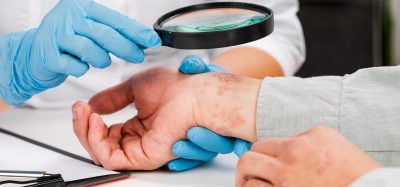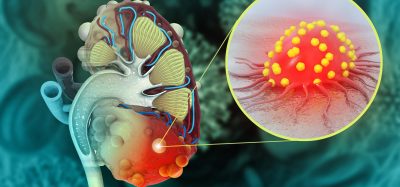Empowering women in STEM: championing change in genetics
Posted: 20 February 2025 | Leah Sabin (Executive Director at Regeneron Genetics Medicines) | No comments yet
An advocate for genetic medicines and the enormous potential they hold, Leah Sabin at Regeneron Genetic Medicines reveals how passion and curiosity can forge the path to a rewarding career in STEM.


Leah Sabin is a distinguished scientist specialising in viruses and genetic medicine. Throughout her career, she has focused on advancing therapeutic drug discovery and developing genetic therapies, making significant contributions to the field. From her early fascination with biology to her current role at Regeneron, she has worked on groundbreaking projects aimed at improving the safety, efficacy and durability of gene therapies. As a woman in STEM, Leah brings a unique perspective to her work, challenging the status quo and fostering a collaborative environment. Below, she shares insights into her career, impactful research, and the future of genetic medicine.
Please tell us about your journey in the field of STEM and the challenges you encountered along the way?
My fascination with biology and the natural world began early in life, growing up as a lover of animals and nature. My interest in viruses, however, started in ninth grade after seeing a video about Ebola virus. These microbes have been the common thread throughout my career; investigating how viruses work and how to modify them to make them into vessels for therapeutics rather than pathogens. I majored in biology in college and later pursued a PhD with the intention of better understanding viruses. I initially envisioned taking the academic route as a principal investigator, but later realised that I thrived in a more collaborative environment. The pivot from academia eventually led to my current role at Regeneron, where I am able to apply my interest in viruses to therapeutic drug discovery and develop new medicines that can hopefully change the way we treat serious diseases.
Could you share an example of a project or research that you have worked on and the impact it has had in your field?
I have dedicated my career to inventing and developing new technologies to progress genetic medicines and hopefully allow them to be used more broadly to address a variety of diseases. One prominent project is my work using antibodies to deliver adeno-associated virus (AAV) gene therapies to targeted cells in the body. The aim is to make gene therapies safer and more efficacious, and open pathways to new therapeutic applications. I also helped develop technology to enhance the durability of liver-directed gene therapies, which could be especially meaningful for children by providing treatment options that have long-term impact as they grow; the prospect of potentially changing lives is exciting.
What potential future applications or implications do you foresee based on your work?
At Regeneron, we ultimately seek to enable groundbreaking therapies for diseases that currently lack effective treatments, including ones that manifest early in life. The work we’re doing has the potential to transform how we address unmet needs for a wide variety of conditions and enhance overall patient outcomes, particularly for people living with cardiometabolic, musculoskeletal, and central nervous system disorders. There is so much potential for the application of genetic medicines and I am excited to be a part of unlocking this potential.
As a woman in STEM, what unique perspectives or strengths do you believe you bring to your work?
I bring a strong sense of curiosity and a commitment to data-driven decision-making – not just as a woman, but as an individual. I love challenging the status quo and fostering an environment where everyone’s ideas are valued, and I strive to empower my colleagues to learn from both successes and failures. Taking risks is what sparks innovation and positions us to really shake things up in healthcare.
What advice would you give to young women who are considering a career in STEM but may be hesitant due to societal stereotypes or perceived challenges?
There are some ingrained perceptions about the types of roles that certain people naturally fall into, and traditionally, girls have not always been encouraged into STEM disciplines. Also, some young women think that in order to work in STEM, they must be good at all four elements – science, technology, engineering and math – which isn’t the case. My advice is to focus on what you love and excel at, rather than trying to master everything. At Regeneron, we appreciate talent that brings deep expertise in specific areas. If you’re passionate about biology but struggle in physics, for instance, you still absolutely belong in STEM, and your unique strengths can lead to incredible contributions.
How do you see the representation of women in STEM changing over the years, and what further progress do you believe is needed?
I’ve seen progress with an increasing number of women and diverse voices in STEM, especially in biotech. It’s encouraging, but we still have work to do. We need to keep pushing for more diverse representation so that all voices are heard and valued. Organisations should invest in early STEM education by providing funding, training and opportunities for aspiring young female scientists to connect with professionals. This kind of exposure is key to understanding what a career in STEM might look like. Plus, having leaders from diverse backgrounds not only helps inspire the next generation but it makes the field richer for everyone.
In your opinion, what can organisations and institutions do to create a more inclusive and supportive environment for women pursuing STEM careers?
Mentorship is important to enable women to progress because it inspires and fosters connections and networks that can facilitate opportunities that might otherwise be out of reach. At Regeneron, we have a mentorship programme in which I participate, and we also conduct a number of outreach programs in our community and nationwide to engage young scientists. It’s all about demystifying STEM careers and providing role models for the next generation.
Looking ahead, what exciting developments or advancements do you foresee in your field of STEM, and how do you envision your own research contributing to those future innovations?
I cannot emphasise enough how hopeful I am about the future of genetic medicines. Our focus on better delivery, safety and durability will pave the way for new potential treatments for serious human diseases. By combining our expertise in antibody technology and gene editing, I believe we can push the boundaries of what’s possible and truly transform patient care.
About the author


Leah Sabin, Executive Director at Regeneron Genetics Medicines
Leah Sabin currently serves as Executive Director at Regeneron Genetics Medicines (RGM). After joining Regeneron in 2015, Sabin began developing a novel technique that uses an antibody as a matchmaker between a virus and a desired target cell in order to improve the safety and specificity of gene delivery. Sabin and her team also co-developed a targeted gene insertion platform, in partnership with Intellia Therapeutics, to pair viruses with CRISPR gene editing systems to insert DNA into a particular site in the genome. She hopes that the approach could lead to more durable treatments, especially in children who may lose the benefits of gene therapies as they grow. Sabin earned her PhD in cellular and molecular biology from the University of Pennsylvania.
Related topics
Drug Delivery, Drug Discovery, Drug Discovery Processes, Gene Therapy, Genome Editing, Immunotherapy, Viral vectors
Related conditions
Cardiometabolic disorders, Musculoskeletal disorders
Related organisations
Regeneron
Related people
Leah Sabin








